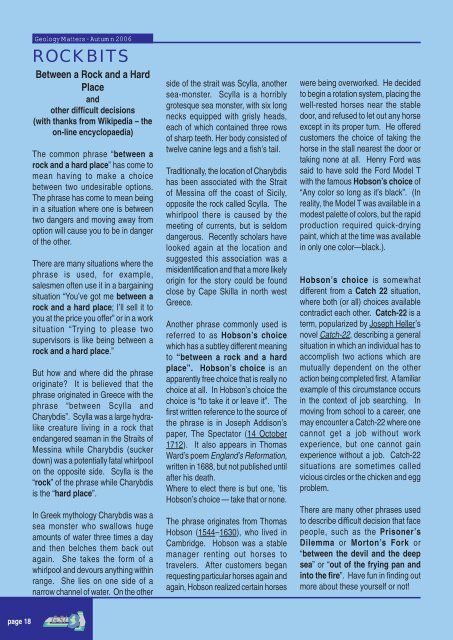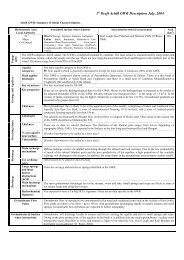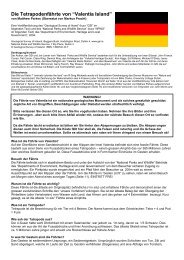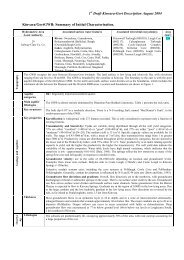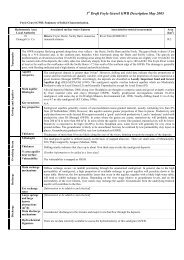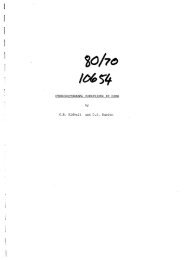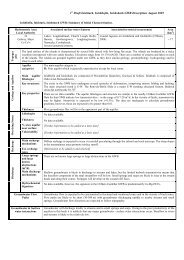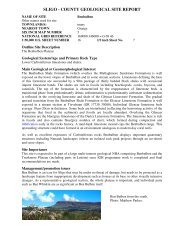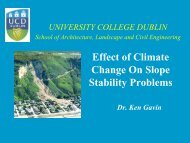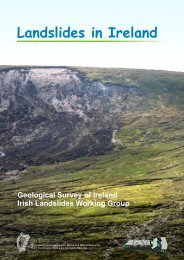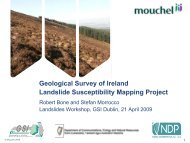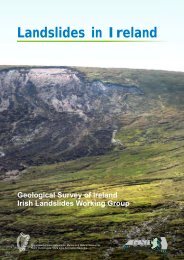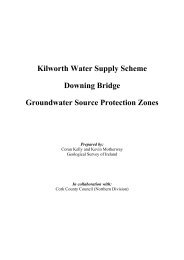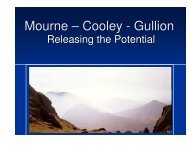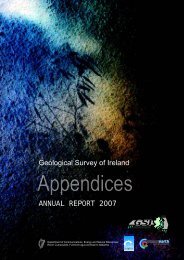Download - Geological Survey of Ireland
Download - Geological Survey of Ireland
Download - Geological Survey of Ireland
You also want an ePaper? Increase the reach of your titles
YUMPU automatically turns print PDFs into web optimized ePapers that Google loves.
Geology Matters - Autumn 2006<br />
Geology Matters - Autumn 2006<br />
ROCKBITS<br />
Between a Rock and a Hard<br />
Place<br />
and<br />
other difficult decisions<br />
(with thanks from Wikipedia – the<br />
on-line encyclopaedia)<br />
The common phrase “between a<br />
rock and a hard place” has come to<br />
mean having to make a choice<br />
between two undesirable options.<br />
The phrase has come to mean being<br />
in a situation where one is between<br />
two dangers and moving away from<br />
option will cause you to be in danger<br />
<strong>of</strong> the other.<br />
There are many situations where the<br />
phrase is used, for example,<br />
salesmen <strong>of</strong>ten use it in a bargaining<br />
situation “You’ve got me between a<br />
rock and a hard place; I’ll sell it to<br />
you at the price you <strong>of</strong>fer” or in a work<br />
situation “Trying to please two<br />
supervisors is like being between a<br />
rock and a hard place.”<br />
But how and where did the phrase<br />
originate? It is believed that the<br />
phrase originated in Greece with the<br />
phrase “between Scylla and<br />
Charybdis”. Scylla was a large hydralike<br />
creature living in a rock that<br />
endangered seaman in the Straits <strong>of</strong><br />
Messina while Charybdis (sucker<br />
down) was a potentially fatal whirlpool<br />
on the opposite side. Scylla is the<br />
“rock” <strong>of</strong> the phrase while Charybdis<br />
is the “hard place”.<br />
In Greek mythology Charybdis was a<br />
sea monster who swallows huge<br />
amounts <strong>of</strong> water three times a day<br />
and then belches them back out<br />
again. She takes the form <strong>of</strong> a<br />
whirlpool and devours anything within<br />
range. She lies on one side <strong>of</strong> a<br />
narrow channel <strong>of</strong> water. On the other<br />
side <strong>of</strong> the strait was Scylla, another<br />
sea-monster. Scylla is a horribly<br />
grotesque sea monster, with six long<br />
necks equipped with grisly heads,<br />
each <strong>of</strong> which contained three rows<br />
<strong>of</strong> sharp teeth. Her body consisted <strong>of</strong><br />
twelve canine legs and a fish’s tail.<br />
Traditionally, the location <strong>of</strong> Charybdis<br />
has been associated with the Strait<br />
<strong>of</strong> Messina <strong>of</strong>f the coast <strong>of</strong> Sicily,<br />
opposite the rock called Scylla. The<br />
whirlpool there is caused by the<br />
meeting <strong>of</strong> currents, but is seldom<br />
dangerous. Recently scholars have<br />
looked again at the location and<br />
suggested this association was a<br />
misidentification and that a more likely<br />
origin for the story could be found<br />
close by Cape Skilla in north west<br />
Greece.<br />
Another phrase commonly used is<br />
referred to as Hobson’s choice<br />
which has a subtley different meaning<br />
to “between a rock and a hard<br />
place”. Hobson’s choice is an<br />
apparently free choice that is really no<br />
choice at all. In Hobson’s choice the<br />
choice is “to take it or leave it”. The<br />
first written reference to the source <strong>of</strong><br />
the phrase is in Joseph Addison’s<br />
paper, The Spectator (14 October<br />
1712). It also appears in Thomas<br />
Ward’s poem England’s Reformation,<br />
written in 1688, but not published until<br />
after his death.<br />
Where to elect there is but one, ’tis<br />
Hobson’s choice — take that or none.<br />
The phrase originates from Thomas<br />
Hobson (1544–1630), who lived in<br />
Cambridge. Hobson was a stable<br />
manager renting out horses to<br />
travelers. After customers began<br />
requesting particular horses again and<br />
again, Hobson realized certain horses<br />
were being overworked. He decided<br />
to begin a rotation system, placing the<br />
well-rested horses near the stable<br />
door, and refused to let out any horse<br />
except in its proper turn. He <strong>of</strong>fered<br />
customers the choice <strong>of</strong> taking the<br />
horse in the stall nearest the door or<br />
taking none at all. Henry Ford was<br />
said to have sold the Ford Model T<br />
with the famous Hobson’s choice <strong>of</strong><br />
“Any color so long as it’s black”. (In<br />
reality, the Model T was available in a<br />
modest palette <strong>of</strong> colors, but the rapid<br />
production required quick-drying<br />
paint, which at the time was available<br />
in only one color—black.).<br />
Hobson’s choice is somewhat<br />
different from a Catch 22 situation,<br />
where both (or all) choices available<br />
contradict each other. Catch-22 is a<br />
term, popularized by Joseph Heller’s<br />
novel Catch-22, describing a general<br />
situation in which an individual has to<br />
accomplish two actions which are<br />
mutually dependent on the other<br />
action being completed first. A familiar<br />
example <strong>of</strong> this circumstance occurs<br />
in the context <strong>of</strong> job searching. In<br />
moving from school to a career, one<br />
may encounter a Catch-22 where one<br />
cannot get a job without work<br />
experience, but one cannot gain<br />
experience without a job. Catch-22<br />
situations are sometimes called<br />
vicious circles or the chicken and egg<br />
problem.<br />
There are many other phrases used<br />
to describe difficult decision that face<br />
people, such as the Prisoner’s<br />
Dilemma or Morton’s Fork or<br />
“between the devil and the deep<br />
sea” or “out <strong>of</strong> the frying pan and<br />
into the fire”. Have fun in finding out<br />
more about these yourself or not!<br />
page 18


